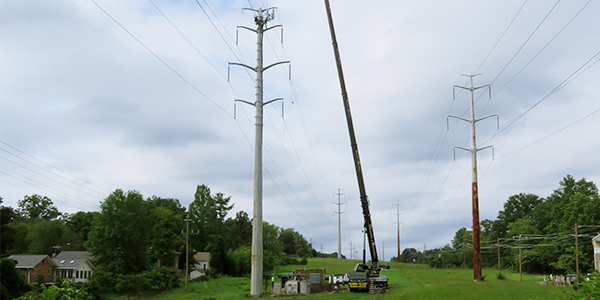FERC on Thursday rejected a PJM joint stakeholder proposal regarding end-of-life (EOL) projects, siding with transmission owners who argued moving EOL projects under the RTO’s planning authority violated their rights (ER20-2308).
The commission also reaffirmed its August decision accepting the TO sector’s own Tariff amendments concerning EOL projects, rejecting arguments in rehearing requests by more than a dozen load-side stakeholders (ER20-2046). The rehearing request was automatically denied when the commission did not rule on it within 30 days. (See Rehearing Sought on PJM End-of-life Order.)
FERC said the proposed Operating Agreement amendments initiated by American Municipal Power (AMP) and Old Dominion Electric Cooperative (ODEC) and passed at the PJM Members Committee meeting on June 18, went “beyond the scope of planning responsibilities” delegated to PJM in the OA.
The June vote created lengthy and vigorous debates among stakeholders and a protest by the TOs, who claimed in a letter and discussions that the amendments violated their rights under the Consolidated Transmission Owners Agreement (CTOA). (See UPDATED: PJM Files EOL Proposal over TO Protest.)
“Consistent with the August 2020 order, we find here that the PJM Transmission Owners retain the right to ‘maintain’ their transmission facilities, and generally reserve all rights not specifically granted to PJM.”
FERC said PJM and the TOs originally signed the CTOA to “memorialize the division of responsibility” in planning between the RTO and the TOs. In its August order, the commission found that, under the terms of the CTOA, the TOs retain all rights that they did not specifically grant to PJM.
Specifically, FERC cited language in the CTOA that TOs agreed to “transfer to PJM … the responsibility to prepare a Regional Transmission Expansion Plan (RTEP) and to provide information reasonably requested by PJM to prepare the Regional Transmission Expansion Plan and shall otherwise cooperate with PJM in such preparation.” The commission said, “Pursuant to the CTOA, PJM is limited to ‘[conducting] its planning for the expansion and enhancement of transmission facilities.’” (See FERC Accepts PJM TOs’ End-of-life Revisions.)
In its 279-page filing in July, the joint stakeholder proposal called for requiring TOs to notify PJM and stakeholders of any facility nearing the end of its life at least six years before its retirement date so that the project could be included in five-year planning models and potentially opened to competitive bidding. It also sought to modify the supplemental project definition to exclude EOL projects, which would become a new category of regionally planned projects.
The commission ruled that the joint stakeholder proposal went too far in its scope, saying a transmission project addressing EOL conditions that is limited to replacing existing equipment or involving an incidental increase in transmission capacity does not involve expansion or enhancement of the regional transmission system.
“Such a replacement project does not fall under regional transmission planning under the PJM Operating Agreement as it relates solely to maintenance of existing facilities, and it does not ‘expand’ or ‘enhance’ the PJM grid as the CTOA requires for transmission planning responsibilities transferred to PJM,” FERC said.
In its order defending its August decision accepting the TO’s Tariff amendments, FERC said it disagreed with the arguments made by load-side stakeholders.
The stakeholders argued that the order was improper because it gives TOs unilateral authority to propose revisions related to transmission planning, veto authority over future planning methodologies, restricts PJM’s role as the regional planner and reduces transparency and the rights of other stakeholders.
The New Jersey Board of Public Utilities also filed a challenge, saying the order violates the transparency principles of Order 890 and ignores cost concerns over “unchecked transmission owner investment.”
FERC disagreed with the stakeholder arguments, citing its ruling in the August order.
“The PJM Transmission Owners’ proposal does not shift responsibility for planning asset management projects from PJM to the PJM Transmission Owners for the very reason that PJM never had this planning responsibility,” FERC said. “The filing merely provides that these projects would be planned according to Order No. 890 principles, making more transparent the procedures the PJM Transmission Owners would use to plan these projects.”
MOPR Rehearing Denied
Separately, the commission gave notice that it had also rejected a request to rehear its Oct. 15 ruling approving most of PJM’s compliance filing on its expanded minimum offer price rule (MOPR) (EL16-49-006). (See FERC Acts on PJM MOPR Filing.)
The rehearing request also was denied automatically when the commission did not act on it within 30 days. The commission said it would provide substantive responses to the rehearing arguments in a future order.




